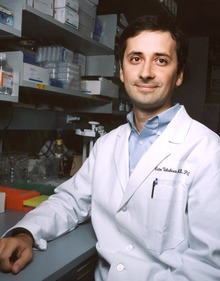Victor Velculescu
| Victor E. Velculescu | |
|---|---|
 |
|
| Born | August 16, 1970 |
| Residence | United States |
| Nationality | American |
| Fields | Genomics, Cancer biology |
| Institutions | Johns Hopkins University |
| Alma mater |
Stanford University Johns Hopkins University |
| Notable awards | Paul Marks Prize for Cancer Research(2011) AACR Award for Outstanding Achievement in Cancer Research,(2009) Judson Daland Prize(2008) |
Victor E. Velculescu (born August 16, 1970) is a Professor of Oncology and Co-Director of Cancer Biology at The Johns Hopkins University School of Medicine. [1,2]. He is internationally known for his discoveries in genomics and cancer research.
Velculescu was born in Bucharest, Romania and moved with his family to Westlake Village, California at the age of seven [3]. He began molecular biology research as an undergraduate at Stanford University, graduating with honors and distinction in biological sciences in 1992. Velculescu completed his M.D. degree, a Ph.D. in human genetics and molecular biology, and postdoctoral studies at the Johns Hopkins School of Medicine where he remains on the faculty [4].
Velculescu and members of his research group have pioneered approaches for discovering molecular alterations in human cancer and applying these discoveries to improve the diagnosis and treatment of cancer.
In 1995 Velculescu developed SAGE (serial analysis of gene expression), a gene expression technology for the global and quantitative measurement of gene activity [5]. The SAGE approach provided some of the first insights into gene expression patterns in eukaryotic cells and the identification of gene expression patterns in human cancer. These studies led Velculescu to coin the term transcriptome in a 1997 paper to describe the comprehensive gene expression patterns that could now be analyzed [6]. SAGE contributed to the development of next-generation sequencing methods used for genome-wide expression analyses [7].
In the early 2000s, Velculescu and members of his laboratory devised new technologies for characterizing the cancer genome. These included digital karyotyping, which allows for quantitative characterization of amplifications and deletions at the DNA level [8]. This approach provided the underlying methodology for next-generation sequencing analyses to detect chromosomal abnormalities in human cancer as well as in prenatal genetic testing [9-10].
In parallel, Velculescu was an early developer of methods for high-throughput sequencing of human cancer [11], which his group used to identify the PIK3CA gene as one of the most highly mutated cancer genes [12].
...
Wikipedia
